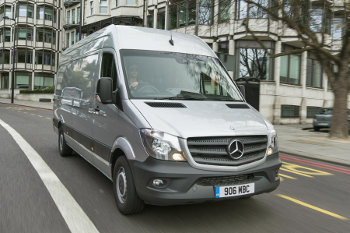 According to research carried out by Mercedes-Benz Vans, 58% of small businesses (SMEs) loan applications are rejected by high street banks.
According to research carried out by Mercedes-Benz Vans, 58% of small businesses (SMEs) loan applications are rejected by high street banks.
The Bank of England has said that lending to small and medium sized businesses under the government’s Funding for Lending scheme has fallen in 2014, with net lending decreasing by £2.7bn in the first quarter, and specific SME lending falling by £723m.
This is a sharp contrast to before the financial crisis — in 2007, records show that 90% of business loan applications were approved.
While it’s probably fair to say that too many loans were being approved in 2007, it’s probably equally fair to say that today — with the economy recovering and unemployment falling — banks could do more to support small businesses than they are doing.
When it comes to buying new vans, the fall in high street lending hasn’t prevented a big surge in new van registrations, which look set to hit pre-recession levels in 2014. One reason for this is that alternative methods of funding new vans are becoming increasingly popular.
One example is vendor financing — Mercedes-Benz Financial Services says that it approves 85% of finance request for new vans, and has recently created a new SME-focused National Business Development team.
Elsewhere, contract hire, leasing and even peer-to-peer lending are also all becoming more popular, as is long-term and daily van rental.
Indeed, van hire is one area that did not suffer overly during the recession. Although some over-leveraged firms went bust, having expanded too rapidly during the boom years, many established rental firms have delivered solid growth over the last five years, as customers have chosen to hire, rather than own, their vans.
There are a number of advantages to this: operationally, it means that the operator does not have to pay for vans when they don’t need them, but can rapidly scale up their fleet to meet short-term demand — a new contract, for example.
Financially, it means that small businesses don’t have to take new debt onto their books, or enter into costly long-term leasing agreements.
Furthermore, by using hire vans, running costs are predictable and minimal, with the rental firm covering most costs and ensuring that vans are maintained as required.
Increasingly, owning vans yourself has few advantages, unless they need to be customised. Even liveried vans are an option in a long-term rental agreement — the quality and affordability of modern vinyl wraps means that custom paint jobs are unnecessary, and a wrapped van can be restored to pristine white in a few hours, once its comes off hire.
It all adds up to a new way of looking at business van ownership.
What do you think? Does your business still finance and own its vans conventionally, or have you been forced to find alternative ways to facilitate van renewal and fleet expansion?
